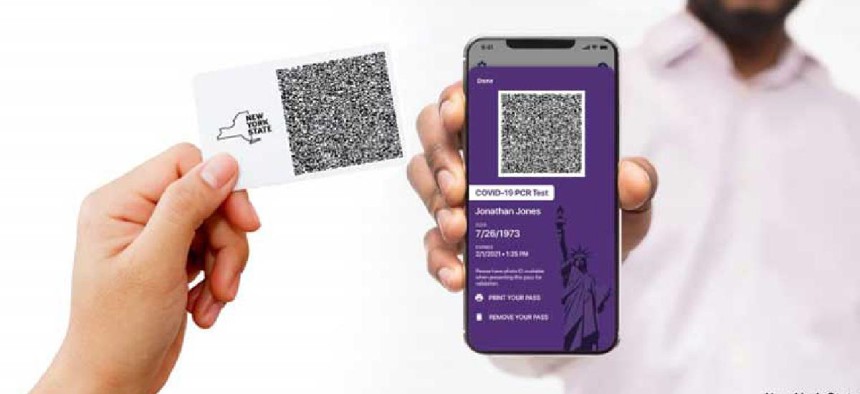Price tag on NY’s vaccination app keeps rising

New York’s Excelsior Pass vaccine authentication app may cost much more than first expected.
First announced in March, the digital vaccine verification app generates a QR code that can be stored on a smartphone 15 days after a person’s second shot. It is gaining popularity in the state as more public- and private-sector organizations are requiring proof of vaccination.
According to The New York Times, the costs of the Excelsior Pass may approach $27 million. When the program was first announced in March, it was expected to cost $2.5 million to develop. A June review of the contract estimated a total cost of $17 million over three years, and a late June contract update added another $10 million.
The Times worked with the advocacy group Surveillance Technology Oversight Project to review the state’s contract with IBM, the app’s developer.
“We always said that Excelsior Pass would be a high-tech distraction from real public health measures, but we had no idea the price would go up this high,” the group’s Executive Director Albert Fox Cahn told The Times. “Even as New Yorkers find themselves on the hook for millions more, the app still isn’t able to do a lot of the basics.”
To verify a person’s vaccination record, the app checks the name, date of birth, ZIP code and county of vaccination against the state’s vaccine registry, and nearly all information must match exactly. Engineers have already fixed issues related to outdated phone numbers, accessibility for the visually impaired, foreign language capabilities and incorrect error messages and crashes, The Times said.
On Aug. 4, a second phase of the program launched. The QR code used for the Excelsior Pass Plus includes the date, place and type of vaccination, instead of just verifying that a person has been vaccinated, allowing for broader use of the app.
A third phase, which is projected to cost $6.7 million, will allow the app to track third doses and include data from residents of New Jersey and Vermont.
According to the paper, the governor’s office said the state had only spent $4.7 million and would only spend the full amount if the program continued to be successful. Additionally, the money so far spent on the program was expected to be reimbursed by the federal government, the governor’s spokesman said.
Meanwhile, the Utah Department of Health has been experimenting with using the Docket app to give residents access to their immunization records as more businesses require proof of vaccination.
To retrieve their vaccination record, users download the app, enter their first and last names, date of birth and gender, and the Health Department sends a PIN to the phone number or email address it has on file. Docket provides access to a user’s complete vaccination record, not just to COVID immunizations.
"[Businesses] are using the information from the state registry over the COVID-19 card because there have been so many issues with COVID-19 cards, with people losing them, even some fraudulent ones out there," Jon Reid, the Immunization Program Manager with the Utah Department of Health, told Fox 13 News.
Docket is also working with New Jersey.
Illinois’ Department of Public Health launched the Vax Verify immunization portal that will allow residents to access their COVID-19 vaccination record online. The state is working with the credit reporting agency Experian to verify the records. After users register, they can see their immunizations in the Illinois Comprehensive Automated Immunization Registry Exchange.
Residents of Arizona, the District of Columbia, Louisiana, Maryland, Mississippi, North Dakota, Washington and West Virginia can use myIR Mobile to download their official state immunization records.
Residents of Louisiana can also add an electronic version of their COVID-19 vaccination records added to their LA Wallet, the state’s digital drivers’ license app.
In Virginia, people who have received vaccinations can download and print a version their COVID immunization records from Vaccinate Virginia website. Californians can also access their records online.
NEXT STORY: Demography Is Not Destiny






